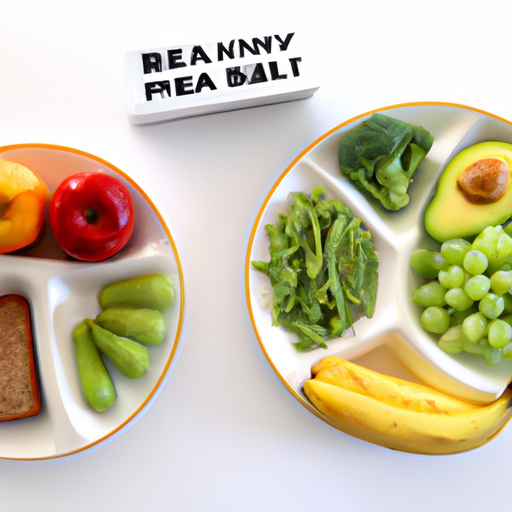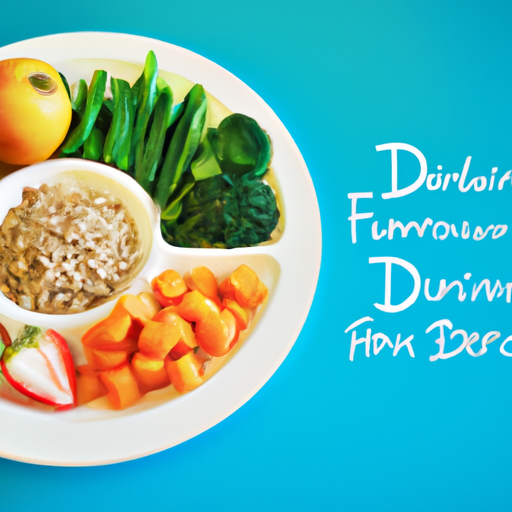Congratulations on your pregnancy! As you embark on this beautiful journey, it is essential to prioritize your health and the health of your baby. Planning a diet for a healthy pregnancy is crucial to ensure that you are providing the necessary nutrients for your little one’s growth and development while keeping yourself in prime condition. In this article, we will explore some valuable tips and guidelines to help you plan a well-balanced and nutritious diet throughout your pregnancy.

Understanding the Importance of Nutrition in Pregnancy
Pregnancy is a crucial time in a woman’s life, and good nutrition plays a vital role in ensuring the health and well-being of both the mother and the developing baby. The nutrients obtained from the mother’s diet are directly responsible for supporting the growth and development of the fetus. From the moment of conception until birth, the growing baby relies entirely on the mother for its nourishment. Therefore, it is essential for expectant mothers to understand the importance of nutrition during this critical period.
The role of nutrients for fetal development
Nutrients such as protein, carbohydrates, fats, vitamins, and minerals are essential for the healthy development of the fetus. Protein serves as the building blocks for cells, tissues, and organs, and plays a significant role in the growth of the baby. Carbohydrates provide the body with energy, which is crucial for both the mother and the baby. Healthy fats, such as omega-3 fatty acids, are vital for the baby’s brain and eye development. Vitamins and minerals, such as folic acid, iron, calcium, and vitamin D, are necessary for the proper formation of the baby’s organs and bones.
Impact of mother’s diet on baby’s health
The mother’s diet directly influences the baby’s health and overall well-being. A well-balanced and nutritious diet can reduce the risks of certain birth defects and complications during pregnancy. On the other hand, an inadequate diet can increase the chances of preterm birth, low birth weight, and other health issues for the baby. Additionally, specific nutrients, such as folic acid, play a critical role in preventing neural tube defects, including spina bifida. Therefore, it is crucial for expectant mothers to prioritize their diet and make conscious choices to ensure the best possible health outcomes for themselves and their babies.
Changes in nutritional needs during pregnancy
During pregnancy, a woman’s nutritional needs significantly increase. The body requires additional nutrients to support the growth of the baby and ensure the mother’s well-being. The overall caloric intake should also increase to meet the increased energy demands. As the pregnancy progresses, the need for certain nutrients, such as iron and calcium, becomes even more crucial. It is important to understand these changing nutritional needs and make appropriate adjustments in the diet to support a healthy pregnancy.
Consulting a Healthcare Professional
Nurturing a healthy pregnancy starts with regular prenatal visits and open communication with a healthcare professional. These visits are crucial to monitor the mother’s health and the baby’s development. During these appointments, it is necessary to discuss dietary habits and seek personalized dietary advice based on the mother’s health conditions.
Importance of prenatal visits
Prenatal visits are essential for monitoring the progress of the pregnancy and detecting any potential issues or complications early on. They allow healthcare professionals to closely monitor the mother’s health, including blood pressure, weight gain, and the baby’s growth. Regular check-ups can also ensure that the mother receives necessary screenings and tests, such as blood work and ultrasounds, to evaluate the overall health and development of the baby.
Discussing dietary habits with your doctor
Having open and honest conversations with your healthcare provider about your dietary habits is crucial during pregnancy. This allows the doctor to understand your current nutritional intake and provide guidance on any necessary adjustments or supplements that may be required. By discussing your diet, you can ensure that you are meeting the nutritional needs of both yourself and your baby.
Getting personalized dietary advice based on health conditions
Each pregnancy is unique, and certain health conditions may require adjustments to the mother’s diet. Conditions such as gestational diabetes or high blood pressure may necessitate modifications in the types and amounts of certain nutrients consumed. By consulting with a healthcare professional, expectant mothers can receive personalized dietary advice tailored to their specific health conditions, ensuring the optimal health of both mother and baby.
Balancing Macronutrients for a Healthy Pregnancy
A healthy and well-rounded pregnancy diet involves balancing macronutrients – carbohydrates, protein, and fats – to ensure adequate nourishment for both the mother and the developing baby.
Proper carbohydrate intake
Carbohydrates are the body’s primary source of energy, and during pregnancy, the need for carbohydrates increases. Whole grains, fruits, vegetables, and legumes are excellent sources of complex carbohydrates that provide sustained energy and essential nutrients. It is essential to choose nutrient-dense carbohydrates and limit the consumption of processed and refined carbohydrates, such as sugary snacks and beverages.
Understanding the importance of protein
Protein is critical for the proper growth and development of the baby. It helps in the formation of cells, tissues, and organs. Incorporating lean sources of protein, such as poultry, fish, eggs, legumes, and dairy products, into the daily diet is essential during pregnancy. These protein-rich foods also provide additional vitamins and minerals necessary for a healthy pregnancy.
Maintaining a healthy fat intake
Healthy fats, such as those found in avocados, nuts, seeds, and fatty fish, are vital for the baby’s brain development and overall growth. These fats also aid in the absorption of fat-soluble vitamins. However, it is crucial to consume fats in moderation and choose sources that are low in unhealthy saturated and trans fats. Balancing the intake of healthy fats is key to maintaining a well-rounded diet during pregnancy.
Incorporating Essential Vitamins and Minerals
Vitamins and minerals play a crucial role in ensuring the proper development of the baby and maintaining the mother’s overall health. Here are some key vitamins and minerals to focus on during pregnancy:
Importance of Folic Acid
Folic acid is crucial for the early development of the baby’s neural tube, which eventually forms the brain and spinal cord. Adequate folic acid intake before and during early pregnancy can significantly reduce the risk of neural tube defects. Leafy green vegetables, citrus fruits, legumes, and fortified cereals are excellent sources of folic acid.
Understanding the role of Iron
Iron is essential for the production of red blood cells, which carry oxygen to both the mother and the baby. During pregnancy, the body needs more iron to support the increased blood volume. Iron-rich foods include lean meats, poultry, fish, fortified cereals, and leafy green vegetables. To enhance iron absorption, it is beneficial to consume vitamin C-rich foods, such as citrus fruits and peppers, at the same meal.
Getting enough Calcium
Calcium is necessary for the development of the baby’s bones and teeth. It also plays a vital role in maintaining the mother’s bone health. Dairy products, fortified plant-based milks, leafy green vegetables, and calcium-fortified foods are excellent sources of calcium. Ensuring adequate calcium intake through diet or supplements is particularly important if the mother is lactose intolerant or follows a vegan diet.
Ensuring adequate Vitamin D levels
Vitamin D is essential for the absorption and utilization of calcium and phosphorus, promoting optimal bone health for both the mother and the baby. Sun exposure, fortified dairy products, fatty fish, and egg yolks are natural sources of vitamin D. However, due to limited sun exposure or dietary restrictions, vitamin D supplementation may be necessary. Consulting with a healthcare professional can help determine the appropriate vitamin D supplementation guidelines for pregnancy.

Healthy Weight Gain During Pregnancy
Weight gain is a natural and necessary part of a healthy pregnancy. Understanding what constitutes healthy weight gain and being aware of the potential risks of excessive weight gain or being underweight during pregnancy is essential.
Understanding healthy weight gain
Weight gain during pregnancy is expected and healthy. The amount of weight gained can vary depending on factors such as pre-pregnancy weight, individual metabolism, and the needs of the baby. In general, a healthy weight gain range is between 25-35 pounds for women starting at a normal weight. However, women who were underweight or overweight before pregnancy may have different weight gain recommendations. Consulting with a healthcare professional can help determine the appropriate weight gain goals for an individual pregnancy.
Risks of excess weight gain
Excessive weight gain during pregnancy can increase the risk of complications for both the mother and the baby. It is associated with an increased likelihood of gestational diabetes, high blood pressure, and the need for a cesarean delivery. Babies born to mothers who have gained excess weight during pregnancy are also more likely to be large for gestational age, which can lead to problems during delivery.
Risks of underweight during pregnancy
Being underweight during pregnancy can also pose risks to the mother and the baby. It increases the chances of delivering a baby with low birth weight, which can lead to health issues and developmental delays. Adequate weight gain is crucial for providing the necessary nutrients for the growing baby and ensuring healthy development.
Importance of Hydration in Pregnancy
Staying adequately hydrated during pregnancy is essential for the overall health and well-being of both the mother and the baby. Water is crucial for supporting various bodily functions, maintaining amniotic fluid levels, regulating body temperature, and aiding digestion.
Dehydration risks during pregnancy
Pregnancy increases the body’s need for water due to increased blood volume and amniotic fluid. Dehydration can lead to complications such as constipation, urinary tract infections, and even preterm labor. It is important to stay vigilant and recognize the signs of dehydration, such as dark-colored urine, dry mouth, dizziness, and fatigue.
How much water to drink during pregnancy
The Institute of Medicine recommends that pregnant women consume around 10 cups (2.4 liters) of fluid per day. This includes fluids obtained from both beverages and foods. Water is the best choice for hydration, but other healthy options, such as herbal teas, milk, and 100% fruit juices, can contribute to overall fluid intake. It is important to avoid excessive consumption of sugary drinks and caffeine, as they can have adverse effects on both the mother and the baby.
Healthy beverage choices
In addition to water, there are other healthy beverage choices that can contribute to proper hydration. Herbal teas, such as chamomile or ginger tea, can provide hydration while also offering additional health benefits. Milk and plant-based milks are excellent sources of hydration and provide essential nutrients like calcium. It is important to limit the consumption of sugary drinks, soda, and caffeinated beverages, as they can lead to unnecessary weight gain and negatively affect both fetal and maternal health.

Meal Planning for a Healthy Pregnancy
Proper meal planning is a key component of maintaining a healthy pregnancy diet. It ensures that the mother receives all the necessary nutrients and helps manage portion sizes and food choices.
Caloric needs during each trimester
The caloric needs during pregnancy vary depending on the individual and the stage of pregnancy. In general, the caloric intake should increase gradually as the pregnancy progresses. During the first trimester, the additional caloric needs are minimal, but they increase to approximately 300-500 extra calories per day during the second and third trimesters. Healthcare professionals can provide personalized guidance on appropriate caloric intake based on pre-pregnancy weight and individual circumstances.
Planning balanced meals
A balanced meal during pregnancy should include a variety of nutrient-dense foods from different food groups. Each meal should consist of a source of lean protein, such as chicken, fish, or legumes, along with a complex carbohydrate, such as whole grains or vegetables. Including healthy fats, such as avocados or nuts, is also important. Additionally, incorporating a variety of fruits and vegetables ensures the consumption of essential vitamins and minerals.
Snack suggestions for added nutrition
Snacks are a great way to boost nutrient intake during pregnancy. Healthy snack options include fruits, vegetables with dip, yogurt, nuts, and seeds. These snacks provide additional vitamins and minerals while also helping to manage cravings and prevent excessive hunger between meals. It is important to choose nutrient-dense snacks and avoid processed and sugary snacks that provide empty calories.
Addressing Common Pregnancy Diet Concerns
Pregnancy can bring about various dietary concerns, including morning sickness, food cravings and aversions, and heartburn and indigestion. Understanding how to address these concerns can help expectant mothers maintain a healthy and well-rounded diet.
Handling morning sickness
Morning sickness, often characterized by nausea and vomiting, can make it challenging for pregnant women to maintain a regular diet. To manage morning sickness, it is helpful to eat small, frequent meals throughout the day and avoid greasy or spicy foods that may exacerbate symptoms. Consuming ginger-based products, such as ginger tea or ginger candies, can also provide relief. If morning sickness becomes severe and persists, it is important to consult with a healthcare professional.
Dealing with food cravings and aversions
Food cravings and aversions are common during pregnancy due to hormonal changes. It is important to listen to the body’s cues but also make healthy choices. Indulging in cravings occasionally is usually harmless, as long as they are balanced with a variety of nutrient-dense foods. If aversions to certain foods make it challenging to meet nutritional needs, finding suitable alternatives or seeking guidance from a healthcare professional can help ensure a well-rounded diet.
Managing heartburn and indigestion
Heartburn and indigestion can be uncomfortable during pregnancy due to hormonal changes and the growing uterus pressing on the stomach. To manage these symptoms, it is helpful to eat smaller, frequent meals, avoid spicy and greasy foods, and refrain from lying down immediately after eating. Additionally, drinking fluids between meals instead of during meals can reduce the likelihood of heartburn. If symptoms persist or worsen, consulting with a healthcare professional is advisable.

Foods to Avoid During Pregnancy
Certain foods pose potential risks to the developing baby and should be avoided during pregnancy to ensure a healthy and safe environment for their growth.
Risk of raw or undercooked foods
Raw or undercooked foods, such as sushi, unpasteurized cheeses, and raw eggs, can contain harmful bacteria or parasites that pose a risk of foodborne illness. To minimize the risk of infection, it is important to thoroughly cook all meats, poultry, and eggs until they reach the appropriate internal temperature. Avoiding unpasteurized dairy products and consuming only pasteurized milk and cheeses is also crucial.
Potential dangers of certain seafood
Certain types of fish and seafood can contain high levels of mercury, which can be harmful to the developing baby’s nervous system. Pregnant women should avoid high-mercury fish, such as shark, swordfish, king mackerel, and tilefish. Instead, opt for low-mercury fish, such as salmon, trout, shrimp, and catfish, which provide essential omega-3 fatty acids and are safe to consume in moderation.
Understanding the risk of high mercury levels
Mercury is a toxic metal that can accumulate in the body, posing risks to both the mother and the developing baby. High levels of mercury can impair the baby’s brain and nervous system development. Therefore, it is important to be aware of foods that may contain high mercury levels and avoid or limit their consumption during pregnancy.
Unpasteurized dairy product risks
Unpasteurized dairy products, such as raw milk and certain soft cheeses, can harbor harmful bacteria, including Listeria, which can lead to miscarriage, stillbirth, or other serious health complications. It is crucial to consume only pasteurized dairy products, which have undergone a heating process to kill potentially harmful bacteria.
Implementing Regular Physical Activity
Regular physical activity during pregnancy offers numerous benefits and promotes overall well-being for both the mother and the baby. Engaging in safe exercises can help manage weight gain, reduce pregnancy discomforts, and promote a healthy delivery.
Benefits of exercise during pregnancy
Exercise during pregnancy has been shown to reduce the risk of gestational diabetes, preeclampsia, and excessive weight gain. It can also help alleviate common pregnancy discomforts, such as backaches, constipation, and swelling. Regular physical activity improves mood, boosts energy levels, and promotes better sleep, contributing to an overall healthier pregnancy experience.
Safe exercise options
Not all types of exercise are safe during pregnancy, so it is important to choose activities that are appropriate and low-impact. Walking, swimming, prenatal yoga, and stationary cycling are generally considered safe and beneficial during pregnancy. It is important to listen to the body and avoid exercises that put excessive strain on the joints or risk of falling.
Exercising in each trimester
As pregnancy progresses, it is important to modify exercise routines to accommodate the changing needs of the body. Depending on individual circumstances, modifications may include reducing intensity, avoiding certain positions, or incorporating additional rest periods. Consulting with a healthcare professional or a certified prenatal fitness instructor can provide guidance on safe and effective exercise routines for each trimester.
In conclusion, proper nutrition is vital for a healthy and successful pregnancy. Understanding the importance of nutrients, consulting with healthcare professionals, balancing macronutrients, incorporating essential vitamins and minerals, managing weight gain, staying hydrated, planning meals, addressing dietary concerns, avoiding certain foods, and implementing regular physical activity are key factors in achieving and maintaining a healthy pregnancy. Prioritizing these aspects of nutrition will contribute to the overall well-being of the mother and the optimal development of the baby.


